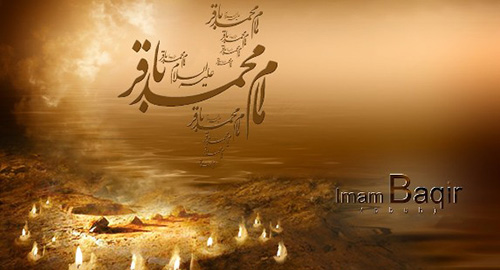“You are the son of three days; your birthday, the day on which you will be taken to your grave, and the day on which you will be resurrected to meet your Lord. That will surely be a horrible day (depending on one’s deeds).”
This bezel of wisdom is indeed food for thought. It ought to make us extra cautious against waywardness and indulgence in frivolities if we want to be immune from the horrors of the Day of Resurrection. The solution is simple. We should adhere to the right path and strive to be virtuous in the mortal life of the transient world, in order to achieve salvation.
These words of guidance were expressed by the person whose martyrdom anniversary we commemorate every year on the 7th of Zi’l-Hijjah, on the threshold of the annual Hajj pilgrimage.
His identity is obvious. He was none other than Imam Muhammad al-Baqer (AS), the great-great-grandson and 5th Infallible Heir of the Almighty’s Last and Greatest Messenger to mankind.
Prophet Muhammad (SAWA) had foretold the Imamate (Divinely-Designated Leadership) of this Impeccable Grandson of his Two Immaculate Grandsons Imam Hasan (AS) and Imam Husain (AS) – maternal and paternal respectively – by hailing him as “Baqer al-Uloum” (Splitter and Spreader of Sciences).
The Great-Great Grandfather had also conveyed his greetings over a half-a-century before the birth of his 5th Successor through the loyal companion, Jaber ibn Abdullah al-Ansari.
Imam Muhammad al-Baqer (AS) proved to be a worthy heir of the Prophet. Born in the Prophet’s city Medina in 57 AH (676 AD), he, along with his father Imam Zain al-Abedin (AS) accompanied Imam Husain (AS) to the fateful field of Karbala in Iraq, where as a hardly four-year old boy, he witnessed the traumatic tragedy that was inflicted upon the Prophet’s Blessed Household, the Ahl al-Bayt.
He said in this regard: “My grandfather was killed while I was four years of age. Indeed, I remember his martyrdom and what befell us during that time.”
At such a tender age he suffered imprisonment in Damascus along with his parents and the womenfolk of the Prophet’s Pristine Progeny in the aftermath of history’s most heartrending tragedy.
He has reported many of its stages while growing up in the shadow of his Illustrious Father, the Fourth Imam, and then during his own Imamate of 19 years, when scholars sat at his feet for explanation of the Ayahs of the Holy Qur’an, the accounts of the Prophets of the past, the rules of the Hajj pilgrimage, the delicateness of the “Nafs” or the soul, and how it should be safeguarded from deviation and pollution in order to achieve salvation in afterlife.
The historian Abu Ja’far at-Tabari has reported some of the events of Karbala on the authority of Imam Baqer (AS). The books titled “Maqtal al-Husain” on the tragedy of Karbala by early Muslim scholars contain several eyewitness accounts reported by the 5th Imam. The bibliographer Ibn an-Nadim has mentioned in his book ‘al-Fihrest’ many of the events of that immortal tragedy which left great pain and sorrow on the Ahl al-Bayt.
Every year it was the habit of Imam Baqer (AS) to perform the Hajj in the correct Abrahamic manner as taught by Prophet Muhammad (SAWA) and the Commander of the Faithful Imam Ali ibn Abi Taleb (AS), including the Qur’anic commandment of “bara’at min al-mushirkeen” (disavowal of disbelievers) while enlightening pilgrims with the tragedy of Karbala, so as to serve as lessons for the faithful for salvation on the Day of Resurrection.
At the same time, he was wary of developments in the political arena where a string of imposters rose and fell – fighting for power of the state that belonged neither to any Omayyad usurper nor to the charlatan Abdullah ibn Zubayr, who during his 10-year occupation of Hijaz, violated the letter and spirit of the Holy Qur’an, mismanaged the Hajj pilgrimage and oppressed the Prophet’s Household.
As the representative of God upon Earth he spared no efforts to guide Muslims and even advised the Omayyad regime to mint currency of its own instead of importing coins from the Roman Empire, thus saving the outflow of the bullion.
Like his Infallible Forebears he was indeed the “Qur’an an-Nateq” (Speaking Qur’an or Qur’an in Action). He stressed the recitation of the Heavenly Scripture, calling it “the abundant source that guides people to righteousness, enlivens their hearts, and supplies them with abilities of light and awareness.”
He has quoted the Prophet as saying: “Whoever recites ten verses on a night is not written among the heedless. Whoever recites fifty verses is written among those who praise (Allah). Whoever recites a hundred verses is written among the obedient. Whoever recites two hundred verses is written among the humble. Whoever recites three hundred verses is written among the successful. Whoever recites five hundred verses is written among the strivers (mujahideen). Whoever recites a thousand verses, a hundredweight of gold is written for him.”
The recitation of the Holy Qur’an, however, should be with firm faith (Imaan) in the heart, a factor that enables a Muslim to rise to the higher status of “Momin” or True Believer, that is, a person who adheres steadfastly to the “Thaqalayn” or two Precious things bequeathed to posterity by the Seal of Messengers – the Book of God and the Prophet’s Pristine Progeny, the Ahl al-Bayt.
Such persons are also called “Shi’a” or faithful followers of the Holy Qur’an and the Ahl al-Bayt, of whom Imam Baqer (AS) has given an interesting definition as follows:
“Indeed, our Shi’as, the friends of Allah and the friends of His Prophet, are those who tell the truth when they speak. They fulfill (the promise) when they promise. Our Shi’as are those who do not praise those who find fault with us, neither do they make friends with those who hate us, nor do they associate with those who betray us… Our Shi’as are those who do not growl as the dog does, are neither greedy as the crow, nor do they ask anyone (for alms) except their brothers, even if they die of hunger…”
He then added: “Our Shi’as fear Allah, obey Him, and always glorify Him. They are humble and pious. They pay the trust. They perform the prayers and the fasting. They obey their parents. They take care of the poor neighbours, the needy, the debtors, and the orphans. They are truthful in talking. They recite the Qur’an. They hold back their tongues from (speaking against) people except good.”
Alas, at the age of 57 in the year 114 AH on the eve of the Hajj, shortly on return home to Medina after release from a brief imprisonment in Damascus by the tyrant Hesham ibn Abdul-Malik, the agents of the regime fatally poisoned him through a saddle laced with venomous substances, and he left the world a martyr.
Imam Muhammad al-Baqer (AS) was laid to rest in the Jannat al-Baqi Cemetery beside his father Imam Zain al-Abedin (AS) and maternal grandfather Imam Hasan al-Mujtaba (AS), by his son and successor Imam Ja’far as-Sadeq (AS). The Grand Mausoleum was demolished in 1925 by Godless vandals.

 صراط عشق صراط عشق
صراط عشق صراط عشق



